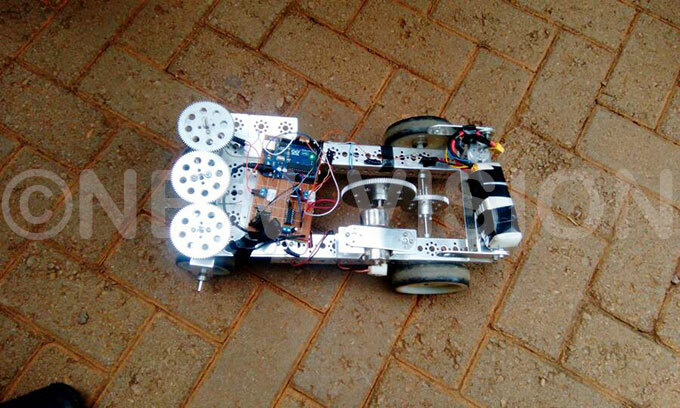Will technology advancement increase unemployment rates?
Oct 24, 2017
Ashraf Miiro, a finalist student of Telecommunications Engineering has made a model computer controlled robot, which he believes is the first of robots that will replace humans in Uganda’s factories.

TECHNOLOGY|UNEMPLOYMENT
Uganda, like many parts of Africa, is grappling with mass unemployment. Many have touted industrialization as Africa's silver bullet to mass job creation for youth. The United Nations' 2015 Economic Report on Africa says industrialization is the answer to paradox of high unemployment and some impressive growth rates on the continent.
"Industrialization promises to address this paradox by promoting economic diversification, inclusive growth, efficient utilisation of abundant physical, mineral and human resources and in the process eliminate poverty and hence structurally transform Africa economies," it says.
However, the world is moving away from having people working in factories and plants, to robots—at least in the west. Some have predicted that in the next decade or so, there will be more robots than human manning operations in plants across Europe and the Americas, and even parts of Asia.
Ashraf Miiro, a finalist student of Telecommunications Engineering has made a model computer controlled robot, which he believes is the first of robots that will replace humans in Uganda's factories.
 The model computer controlled robot developed by Miiro
The model computer controlled robot developed by Miiro
Ashraf Miiro, a finalist student of Telecommunications Engineering has made a model computer controlled robot, which he thinks is the first of many robots that will replace humans in Uganda's factories.
"For example, if you have a factory, and you have to move things from one point to another, you do not have to hire drivers for cars to move around your plant. All you need is a centralized control, so he or she just controls the vehicles on a computer," he explains how it works.
"This way, you will not need to hire drivers."
When asked about whether his innovation would take away jobs from young people in the future, he masters a laugh
"You can put that in consideration," and he laughs again.
Miiro reluctantly agrees that advances in the technology could end up causing unemployment as collateral damage, but he says people should just adapt to the times.
"The world is advancing, people have to advance too. You have to improve your skills so that if my machine comes and takes away your job, you have something else to do," he says.
Miiro was one of the students showcasing different innovations up during the Open Day and Exhibition held at Makerere University's College of Engineering, Design, Art and Technology on October 20th.
Olivia Nakayima, a third year student of computer engineering, who alongside Gorret Namulondo, designed a colour sorter robot which the duo showcased at the open day, shared the same sentiments.
"We are already in the world of the internet of things. We are doing away with manual things, and going for computerized systems. That is just the way it is," she says.
So are industries still the answer to massive unemployment with young minds like Miiro, Nakayima and Namulondo coming through? In the meantime, the likely answer is ‘yes'—for as long as robots are away.
